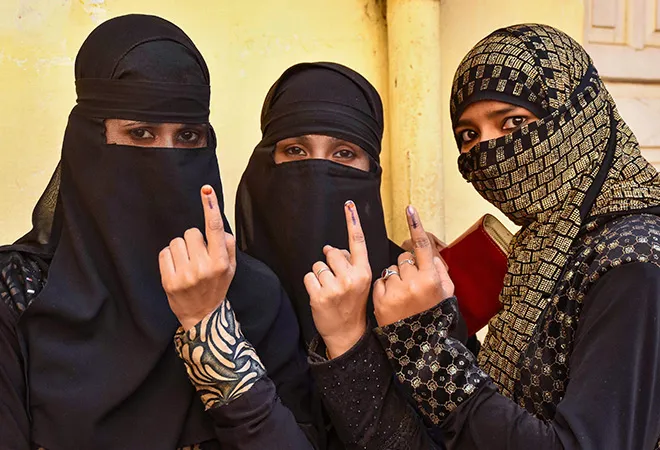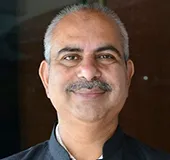
Prime Minister Narendra Modi led National Democratic Alliance (NDA), in conventional wisdom, continues to be the front runner in the ongoing electoral battle. However, the complexity of elections, volatility of voters, absence of strong regional BJP leadership in several States like Bengal, Tamil Nadu, Kerala, Andhra, Telengana and anti-incumbency factor against ruling NDA coalition MPs has made 17th Lok sabha contest a lot more stimulating.
Prime Minister Modi stands tall, leading from the front, with a slight edge for the ruling NDA. An under-current of sorts for Modi on account of the airstrikes and a clean image has the potential for ensuring another five years in office. But, this is one of the many possibilities. If the 2019 Lok Sabha is contested on Modi versus "Maths," where caste considerations, local issues and State wise alliances influence voting pattern more than the issue of national security and nationalism, the 23 May verdict may usher in some surprises.
The Key: Uttar Pradesh
Uttar Pradesh continues to hold the key. The outcome of the 80 parliamentary seats there will decide who will rule Delhi for the next five years. On the face of it, Modi's charisma is staying and in the context of hyper nationalism and matters of national security, the BJP should be having an edge. In addition, Yogi Adityanath's appeal and oratory skills have provided the BJP a cutting edge. But on the other side of the political spectrum, the caste equations are working. At least it was evident the way Jats, Yadavs, Dalits and Muslims had come together at the Deoband rally. It was just not a crowd but a gathering where otherwise confronting and warring castes seemed at peace with one another with a collective resolve to accord primacy to the matters of their bread and butter. The coming together of Dalit-Muslim is not confined to Uttar Pradesh alone. If this Gathbandhan bonhomie translates into votes and seats, the BJP will be in trouble in Uttar Pradesh. Any loss of 35-40 -0dd seats from Uttar Pradesh simply can not be compensated from Bengal, Odisha, Assam or the North East.
Some of Yogi's utterances not only resulted in him getting temporarily banned from poll campaign but reduced the chances of BJP getting Muslim votes. For instance, in Lucknow, the BJP has had a history of attracting a sizeable number of Shia community votes. But Yogi's "
We have Bajrang Bali you have Hazrat Ali" and “
Green Virus” remarks have a potential of antagonising a number of Muslim votes.
Some of Yogi's utterances not only resulted in him getting temporarily banned from poll campaign but reduced the chances of BJP getting Muslim votes.
The BJP has a problem in the South too where, except for Karnataka, it lacks strong foot-print. A visit to Chennai and parts of Tamil Nadu has shown that the DMK-Congress alliance has far more traction and acceptability than the ADMK-BJP tie up. In the absence of iconic Jayalalitha and Karunanidhi, M K Stalin has emerged as a towering leader. This is one State where popular ratings of Modi are far lower than Rahul Gandhi. In fact, this has been the case in States of Bengal, Odisha, Kerala, Andhra, Telengana too where popular ratings of Modi are below the ratings of regional leaders.
The results on 23 May 23 will give us an important answer whether Prime Minister Modi have the strength and charisma to override caste factors, overcome anti-incumbency and beat the regional leaders? If he achieves that feat, the country will have him as a leader in the league of Jawaharlal Nehru and Indira Gandhi – and even a notch ahead of even Atal Bihari Vajpayee.
Silence of Muslims
Even as the national media analyses the political scene, one of the significant trends escaping its attention is the studied silence and patience of Muslims. Muslim clergy have refrained from issuing any fatwas (religious decrees) in favour of one political party or the other. Five years ago, the then Congress president and UPA chairperson Sonia Gandhi had held an open meeting with Shahi Imam of Jama Masjid Syed Ahmed Bukhari. Following this, the 13th imam of historic Jama Masjid had issued an appeal asking Muslim leaders to ensure that secular votes did not split in the Lok Sabha polls. Bukhari had announced support for the Congress Party when Sonia Gandhi had reportedly promised to improve the conditions of Muslims if the UPA was voted back to power. Other issues on the platter were release of Muslim youths arrested in terror cases, reservation in education, implementation of Sachar Committee and Ranganath Misra Commission recommendations and passage of anti-communal violence bill. This time, with the second round of polling also over, there is no sign of any fatwa across the country.
Even as the national media analyses the political scene, one of the significant trends escaping its attention is the studied silence and patience of Muslims. Muslim clergy have refrained from issuing any fatwas (religious decrees) in favour of one political party or the other.
There is also near absence of any major hate speech too from those claiming to represent the voice of the Muslim community. Azam Khan’s atrocious and distasteful remark against actress Jaya Prada comes in the category of sexist and misogynist utterances.
In 2014, Imran Masood, a Congressman from Uttar Pradesh, had threatened Modi, the then prime ministerial candidate. His threat to "
chop Narendra Modi into pieces" had sent shock-waves across the country. Masood was jailed for his hate speech in March 2014 and subsequently lost the Lok Sabha polls from Saharanpur. Akbaruddin Owaisi was another odd-ball when he had made an atrocious remark, resulting in his arrest and criminal cases.
Owaisi had spoken in Urdu in 2013 when he had said "Oh Hindustan – We are 25 crores, you are 100 crores. Remove the police for 15 minutes and we will show you who has more courage and strength.
Muslims and BJP
In many constituencies of Hindi heartland, community leaders, teachers and social activists are busy studying and analysing data to make sense of the past voting pattern. These exercises are aimed at looking at the combinations on how a particular candidate can win in multi-corner contest. Interestingly, some NDA allies like the JD(U) have a potential of attracting Muslim voters. The ties between Muslims and the BJP are far more complex and lacking mutual trust. A section of young Muslims, particularly young women, view the BJP as an option due to its stand on instant Triple Talaq, increase in funds for scholarships, preparations for competitive exams etc. As many as 2.52 crore minority students, half of them girls, have availed
three scholarship schemes being offered by the Modi government. But incidents of mob lynching and Amit Shah's statement on the National Register for Citizens (where Muslims have not figured) has stroked the old distrust model. In a
paper published by ORF, I have argued that there is a need to bring in a special law to deal with the menace of mob lynching on the lines of a similar law dealing with the atrocities against the scheduled caste and scheduled tribes.
Interestingly, some NDA allies like the JD(U) have a potential of attracting Muslim voters. The ties between Muslims and the BJP are far more complex and lacking mutual trust.
Away from public glare, Muslim community leaders have worked and influenced the Samajwadi Party and the Bahujan Samaj Party to come together. They are also instrumental in prevailing upon Jagan Mohan Reddy's YSR Congress in Andhra and K Chandrashekhar Rao's Telengana Rashtriya Samiti from pre-poll alliance with the BJP. In Maharashtra, dalit activist Prakash Ambedkar's Vanchit Bahujan Aghadi (VBA) has teamed up with Asaduddin Owaisi's All India Majlis-e-Ittehadul Muslimeen (AIMIM) to pose a challegne to both the BJP-Shiv Sena combine and the Congress-Nationalist Congress Party.
For the Congress too, stakes are high. For the first time in contemporary Indian elections, there are three Gandhis out in the field, trying to make Congress story a success. If Sonia Gandhi, Priyanka Gandhi and Rahul Gandhi can not take the grand old party to 100 plus seats figure in the Lok Sabha, the bond between Congress and Gandhis will slowly start breaking and there is every possibility that in the event of Modi getting a clear majority, "janatadalization" of Congress will begin sooner than expected.
The views expressed above belong to the author(s). ORF research and analyses now available on Telegram! Click here to access our curated content — blogs, longforms and interviews.



 Prime Minister Narendra Modi led National Democratic Alliance (NDA), in conventional wisdom, continues to be the front runner in the ongoing electoral battle. However, the complexity of elections, volatility of voters, absence of strong regional BJP leadership in several States like Bengal, Tamil Nadu, Kerala, Andhra, Telengana and anti-incumbency factor against ruling NDA coalition MPs has made 17th Lok sabha contest a lot more stimulating.
Prime Minister Modi stands tall, leading from the front, with a slight edge for the ruling NDA. An under-current of sorts for Modi on account of the airstrikes and a clean image has the potential for ensuring another five years in office. But, this is one of the many possibilities. If the 2019 Lok Sabha is contested on Modi versus "Maths," where caste considerations, local issues and State wise alliances influence voting pattern more than the issue of national security and nationalism, the 23 May verdict may usher in some surprises.
Prime Minister Narendra Modi led National Democratic Alliance (NDA), in conventional wisdom, continues to be the front runner in the ongoing electoral battle. However, the complexity of elections, volatility of voters, absence of strong regional BJP leadership in several States like Bengal, Tamil Nadu, Kerala, Andhra, Telengana and anti-incumbency factor against ruling NDA coalition MPs has made 17th Lok sabha contest a lot more stimulating.
Prime Minister Modi stands tall, leading from the front, with a slight edge for the ruling NDA. An under-current of sorts for Modi on account of the airstrikes and a clean image has the potential for ensuring another five years in office. But, this is one of the many possibilities. If the 2019 Lok Sabha is contested on Modi versus "Maths," where caste considerations, local issues and State wise alliances influence voting pattern more than the issue of national security and nationalism, the 23 May verdict may usher in some surprises.
 PREV
PREV


